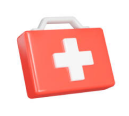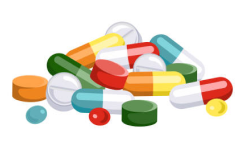Uses
What is Opioids for?
Opioids are a class of medicine that are used to relieve moderate to severe pain (analgesics) and can be used for both acute (fast onset and short duration) and chronic pain (pain of longer duration). Opioids bind to proteins known as opioid receptors found in many parts of the body, particularly the central nervous system, to cause a decline in the way you feel and respond to pain.
Opioids are one part of a treatment regimen for pain. Mild to moderate pain is usually treated initially with non-opioid drugs such as paracetamol and anti-inflammatory pain medicines. Other pain treatments also include exercise programs, physical therapy, acupuncture, massage and cognitive behavioural therapy.
Opioids are useful when other pain medicines such as paracetamol and anti-inflammatory pain killers are not effective in relieving pain when the benefits of opioid treatment potentially outweigh the risks. Sometimes they are used in combination with other pain killers to enhance their effect.
Opioids are available as different types of preparations; syrups, tablets, capsules, patches and injections. How you use the drug will differ depending upon the preparation and the drug. Take your medicine only as directed by your doctor, if unsure please consult your doctor / pharmacist.
Opioids may be divided into those which have a strong effect versus those with a weaker effect. Common examples include:
| Weak opioids | Strong opioids |
|
|
How should I take or use Opioids?
Opioids are an important part of pain management. However, as opioids come with potential risks it is important to adhere strictly to the medication instructions given by your doctor.
The dose of your drug may need to be altered to treat your pain, if you find the pain persisting despite the maximum prescribed dose please consult your doctor, otherwise do not exceed the prescribed dose.
What should I do if I forget to take or use Opioids?
If you miss a dose, take it as soon as possible. However, if it is almost time for your next dose, then skip the missed dose. Do not take two doses at once. Otherwise if you miss several doses in succession or are uncertain how to restart your medication consult your doctor or pharmacist.
Precaution
What precautions should I take when taking or using Opioids?
Do check with your doctor or pharmacist before taking opioids if you:
- have any drug allergy, particularly with respect to pain killers.
-have any pre-existing medical condition including but not limited to : a history of seizures, altered / impaired liver or kidney function, low blood pressure, irregular heart rhythm, any respiratory conditions (e.g. asthma, chronic obstructive pulmonary disease (COPD), chronic constipation or difficulty passing urine, alcoholism or a history of illicit drug use.
-are taking any medicine, including herbal remedies, traditional Chinese medicines or over the counter medicines.
What food or medication should I avoid when I take or use Opioids?
Opioids may increase the effects of drowsiness or other side effects caused by other drugs. This includes but is not limited to sleeping tablets, anti-anxiety tablets (including benzodiazepines such as diazepam, lorazepam and clonazepam), certain drugs for depression and psychiatric conditions, some antihistamines / allergy tablets, alcohol as well as other opioids and pain medication (including gabapentin and pregabalin). Inform your doctor if you are taking any other medication including herbal and over the counter medicines before using opioids.
Avoid alcohol if you are taking any opioids, as it will increase the risk of side effects.
Do not take over the counter medicines without first consultant your pharmacist / doctor
Side Effects
What are some common side effects of Opioids?
Prescription opioids carry serious risks of addiction and overdose, especially with prolonged use. An opioid overdose can cause life threatening breathing difficulties often marked by slowed breathing, and can cause sudden death.
The use of prescription opioids can have a number of side effects as well, even when taken as directed. Only take your medicine as directed by your doctor carefully, if you have concerns please consult your doctor.
Common side effects which may occur with opioids include but are not limited to:
| Gastrointestinal | Constipation, gastric discomfort, dry mouth, nausea and vomiting |
| Neurological | Dizziness, drowsiness |
| Dermatological | Itch, rash |
| Eye | Blurred vision |
| Others | urinary retention |
Some side effects such as nausea, vomiting and constipation may improve as you use the drug but other side effects may be prolonged. Your doctor may prescribe anti-sickness drugs (for nausea and vomiting) as well as laxatives (for constipation) to be used concurrently with your drug in order to alleviate its associated side effects.
If you find you are sleepy / drowsy or cannot concentration while taking the drug, do not drive or operate machinery. This is particularly a concern if the dose of the drug has recently been changed.
Opioids can cause serious life-threatening respiratory depression which can occur at any time during opioid use, and at any dose. Furthermore some individuals may be allergic to opioids. A person experiencing any of the following: significant confusion or severe drowsiness, significant difficulty waking or not being arousable, slowed breathing or not breathing, passing out or having a seizures, inability to urinate, swelling of the lips, face, tongue and throat; refer to a doctor as a matter of emergency (Call 995).
If you take the drug regularly for several days or more, your body may become accustomed to the drug. As a result you may develop effects of the drug upon sudden withdrawal. These may include sweating, gastrointestinal cramps, diarrhoea and muscle ache. If these occur, consult your doctor.
Furthermore the pain reducing effect as well as some side effects, may gradually decrease with regular use. If you find the effectiveness of the drug has decreased, or otherwise develop any unusual side effects, consult your doctor.
Handling
How should I store Opioids?
- Keep away from children
- Keep in a cool, dry place, away from direct sunlight
How do I throw away Opioids safely?
When your pain has resolved, your doctor, nurse or pharmacist can advise on how best to dispose of any unused medicines.
For more information
What else should I know about Opioids?
Check with your doctor or pharmacist if you are pregnant, intend to get pregnant or are breast-feeding.
What should I do if I overdose?
Signs and symptoms of an opioid overdose include: extreme sleepiness, slow or no breathing, very small pupils and a very slow heartbeat. In the event that you or somebody you know who is taking opioids experience any if these symptoms consult your doctor immediately; phone 995.
Disclaimers
If you take more than the recommended dose, please seek medical advice immediately. The information provided on this page does not replace information from your healthcare professional. Please consult your healthcare professional for more information.
This article is jointly developed by members of the National Medication Information workgroup. The workgroup consists of cluster partners (National Healthcare Group, National University Health System, and SingHealth), community pharmacies (Guardian, Unity, and Watsons), and the Pharmaceutical Society of Singapore. The content does not reflect drug availability and supply information in pharmacies and healthcare institutions. You are advised to check with the respective institutions for such information.
Contributed by
Last Updated on June 2018

Need More Medicine?
Use Medicine Order Service on HealthBuddy.

Medicines Reminder
Get reminders and chart progress on HealthBuddy.
Related Medicines or Drugs

















